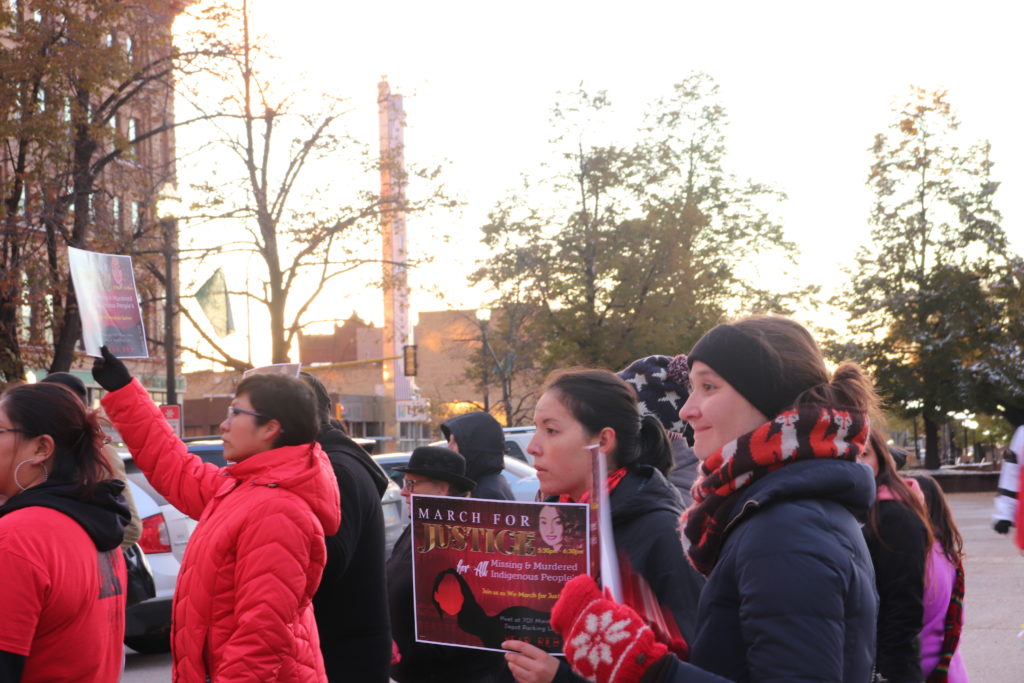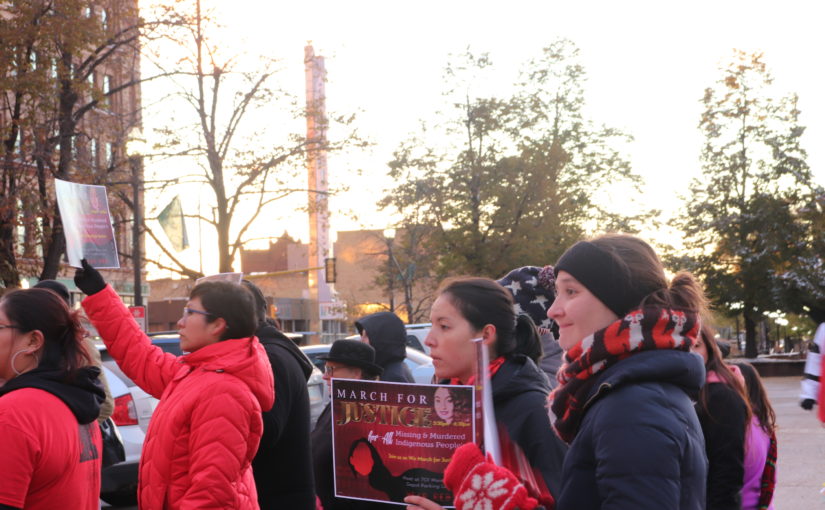
Students activists march for #MMWC.
With the trials in the Savanna LaFontaine-Greywind case, missing and murdered women and children in the indigenous community have come to the forefront in Fargo. On Thursday, Oct. 11, people from the Native community marched in protest.
The march was bookended by LaFontaine-Greywind’s father who expressed anger over the fact that one of the defendants was not found guilty on conspiring to commit murder. “We’re mad at the community. We’re mad at the jurors. We’re mad at the police. We’re mad,” he said. “This ain’t right. This is all common sense right here. It’s common sense what these guys did.”
The march started toward Main Avenue and followed Broadway toward the Bismarck Tavern and back to Main Avenue. Protesters sang traditional indigenous music and carried signs that read: “We are our sister’s voices” and “She’s not forgotten.”
Marching along Broadway was a North Dakota State student with a personal connection to the cause. Two years ago, Ambrosia YellowBird’s aunt went missing and was found raped and murdered “pretty much just like Savanna La-Fontaine-Greywind,” YellowBird said.
Since her aunt was found, YellowBird said, “I made it my calling to fight for missing and murdered indigenous women and children.” All the men involved in her aunt’s death were indicted and charged this year.
“Up until Savanna LaFontaine-Greywind and Olivia Lone Bear, no one knew it was an issue.” – Ambrosia YellowBird
YellowBird said up until 2014 it was hard to prosecute non-native people for crimes committed on the reservation. The community is still trying to figure out how many indigenous women are missing at this point, according to YellowBird.
“Up until Savanna LaFontaine-Greywind and Olivia Lone Bear, no one knew it was an issue,” YellowBird said. “Because no one reports it, no one talks about it (and) no one does anything about it.”
YellowBird said she has seen a lot of support in the indigenous community, but not much from anywhere else. “From pretty much everyone else, politicians, the general public, everyone else pretty much just shuns us,” she said.
YellowBird gave some credit to the media for helping the issue become nationally known.
The march was well attended, according to YellowBird. “People came out even though it was cold,” she said. “There were children. There were elders. There were college students. It’s not just natives.”
McKenzie Huson, another NDSU student, said she was invited by YellowBird to the event. Huson organized the March for Our Lives in Bismarck, North Dakota and is involved with the Women’s Activist Organization and NDSU Democrats on campus.
“Being a voice for these women is why I’m here.” – McKenzie Huson
“I’m really passionate about politics and women’s rights in general, so as soon as I heard about this, I instantly knew I wanted to come,” Huson said.
Women, and indigenous women specifically, are very mistreated, according to Huson. She said no one listens or cares when women go missing or are sexually assaulted. “Being a voice for these women is why I’m here,” Huson said.
The march fell on the birthday of Lone Bear, who went missing last October. Her body was found in August this year. The reason and circumstances around the case are still unknown.
According to the Coalition to Stop Violence Against Native Women, the murder rate for women is 10 times that of other groups.
